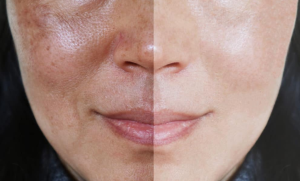

Melasma is a common skin condition characterized by the development of brown or grayish-brown patches on the skin, primarily on the face. It occurs due to the overproduction of melanin, the pigment responsible for the colour of our skin, hair, and eyes. Melasma is more prevalent in individuals with darker skin tones and is more common in women than men, especially during their reproductive years. While it is not a harmful medical condition, it can cause cosmetic concerns and affect a person’s self-esteem.
Etiologic factors include genetic influences, ultraviolet (UV) radiation, pregnancy, hormonal therapies, cosmetics, phototoxic drugs, and antiseizure medications.
Melasma stimulates melanocytes by the female sex hormones estrogen and progesterone, producing more melanin pigments when the skin is exposed to the sun.
Genetic
Genetic predisposition may be a major factor in the development of melasma.
Sunlight Exposure
UV radiation can cause lipids peroxidation in cellular membranes, resulting in free radicals which could stimulate melanocytes to produce excess melanin.
LED Screens:
Melasma may be caused by the LED lights from your television, laptop, cell phone and tablet.
Hormonal Influences
Hormones may play a role in developing melasma in some individuals.
Thyroid Disease
There is a four-fold increase in thyroid disease in melasma patients.
It typically occurs on the face and is symmetrical, with matching marks on both sides of the face.
Diagnosis
While not all cases of melasma will clear up with treatment, there are things you can do to make sure the condition doesn’t get worse and to minimize the appearance of the discoloration. These include:
Wearing protective clothing is especially important if one will be in the sun for an extended period of time.
Triggers:
Certain factors can exacerbate melasma or trigger its onset, including excessive sun exposure without proper protection (sunscreen and protective clothing), hormonal fluctuations, and the use of certain medications that may increase sensitivity to UV rays.
Melasma is a manifestation of an underlying imbalance or disturbance in the body’s vital force (life force). Homeopaths aim to identify the unique symptoms and characteristics of the individual with melasma to prescribe a highly diluted remedy that matches the person’s overall symptom picture.
During a homeopathic consultation for melasma, a practitioner will gather detailed information about the person’s physical symptoms, emotional state, lifestyle, and overall health. They will consider the pattern of pigmentation, any triggers or aggravating factors, and any other associated symptoms to choose a suitable homeopathic remedy.
Homoeopathy has safe and effective remedies for treating the melasma it helps by restoring and even tone to skin and controlling further progression of pigmentation
FEW HOMEOPATHIC MEDICINES WHICH HELP IN MELASMA
1. Sepia officinalis:
Sepia is one the excellent remedies for melasma. There is yellowish- brownish spots on face, especially cheeks, forehead and cheeks and nose.
A yellow saddle across the upper part of cheeks and nose. There is dark circle under the eyes. Facial discoloration during pregnancy, after childbirth and menopause .Sepia is suited to persons having dark hair, and rigid fibre.
2. Berberis Aquifolium:
For Treating Facial Pigmentation from Eruptions Berberis Aquifolium is a highly effective and reliable remedy for treating pigmentation spots and scars on the face left behind by any kind of eruption.
The skin may feel waxy, the cheeks may feel how, skin becomes dry, rough, scaly and pimply and it clears the skin.
4. Cadmium Sulphuratum:
For facial pigmentation that gets worse with exposure to the sun, Cadmium Sulphuratum is the best prescription. The pigmentation varies from yellowish to brownish in colour
Pigmented spots are present over the entire face, but most prominently on the nose and cheeks. Another guiding symptom for use of Cadmium Sulphuratum is that pigmentation gets worse in the wind. The face may feel itchy. Pigmentation that Worsens in Sun.
5. Pulsatilla Nigricans:
It is a most effective medicine for facial pigmentation in women with menstrual irregularities. The irregularities include delayed periods, scanty menses and suppressed menses. They show up as pigmented spots and freckles on the face. Pulsatilla is also helpful for acne resulting from menstrual irregularities.
6. Psorinum:
For facial pigmentation attended with greasy, oily, waxy skin, Psorinum is the medicine to go to. Facial skin looks dull, pale and sick. The face is covered in pigmented spots that may be attended with itching. Acne – papular or pustular – may be present on the face.
7. Sulphur:
Sulphur is a highly reliable medicine for facial pigmentation with dry skin. The skin looks unhealthy and dirty. The person complains of itching and burning sensation on the face. Itching gets worse in the heat. Sulphur is also a good choice of medicine to treat facial pigmentation that has been subjected to ointments and external topical applications in the past.
There are many medicines in homeopathy if given in exact dose and potency after matching the totality of symptoms of the patient with that of the medicine, ease the suffering of the patient, so one should seek an expert’s opinion before starting the homeopathic treatment for Melasma.
Cosmic Homeo Healing Centre is run by second generation Homeopath Dr. Mahavrat Patel having vast clinical records of more than 75 years and clinical experience of nearly 50 years in the treatment of various cases of Melasma. Under the able guidance of Dr. Mahavrat Patel, our team of experts has been successfully treating thousands of cases of Melasma for many years.
Vadodara :-
208-211, Pancham Icon, Besides Vasana
D-mart , Vasana Bhayali Road, Vadodara,
Gujarat, India-390007
+91 63598 76699
View On Google Map
Ahmedabad :-
238, Samaan Complex, Opp. Satyam
Mall Kameshwar School to Mansi Circle Road,
Ahmedabad, Gujarat, India-380054
+91 81604 74568
View On Google Map

Vadodara
Dr. Mahavrat Patel :
Monday to Saturday-10:00 AM to 01:00 PM &
05:00 PM to 08:00 PM
Ahmedabad
Dr. Mahavrat Patel : ( Only on Alternate Sundays by Appointment Only )
Dr. Swapni Patel :
Monday to Saturday-10:00 AM to 01:00 PM &
05:00 PM to 08:00 PM
WhatsApp us